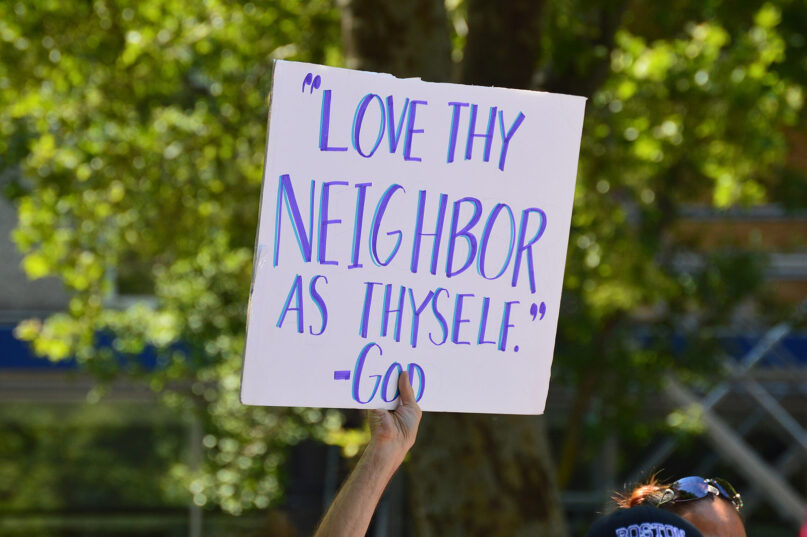(RNS) — As we reflect on the upcoming inauguration and on the recent election, many are struggling with how to move forward. The past year has seen political violence, including assassination attempts, and discord in our communities. The result, as intended, is that our faith in democracy and one another has been deeply shaken. Next week’s inauguration marks an important moment in the democratic process: the peaceful transfer of power, a tradition that underscores the resilience of our democracy, even in times of deep division.
For some, this most recent election has shaken their faith in God. For many of us, how we cast our votes is a way that we take action to address our concerns for ourselves and our communities. Implicitly, votes cast for other candidates lead us to believe those voters do not care for us, our families or our friends. A successful democracy requires trusting the systems that allow us to participate and relying on our neighbors to help us determine our future. But how can we do that when we feel our neighbors have become enemies who support leaders who threaten our safety or insult us?
In an increasingly diverse United States, a thriving democracy depends on the participation of others across lines of difference, which might feel impossible after an election like this. Across faith traditions, we are directed to show loving-kindness, care, compassion and hospitality to strangers and enemies. But now, we ask ourselves, how can I be called to love someone who voted for someone so vile, someone who has such different desires for our country’s future, someone who, when faced with a clear right vs. wrong decision, chose the wrong one — and still believes in that choice? Times of deep division are not uncommon across human history. We can help move to reconciliation after heartbreak by examining how faith traditions have been navigating it across generations.
Our traditions teach us how to denounce behavior that harms us and others while being merciful and forgiving to the person who caused the harm. Rituals, rites and practices teach us how to seek and repair relationships with one another in the face of conflict and hurt. Our prophets and teachers model how to be honest while remaining kind, even with those who oppose them. Holy texts and songs remind us how to grow in wisdom by seeking the right answers to hard questions, and they teach us that for the most challenging questions, we must seek wisdom together. These are the tools we need as we discern our country’s future. We rely on each other to show up and put the community’s needs forward to find a solution. The democratic process often requires compromise, which works for a short time. But our faiths teach us how to build wisdom with one another and look for longer-term solutions that no individual can find on their own.
Across faith traditions, there is a mandate to love and respect others. In Christianity, loving our neighbors is a part of the Greatest Commandment. In Buddhism, loving-kindness is needed to achieve enlightenment. And both Judaism and Islam say that showing love and mercy pleases God. All of these faith traditions center on love and relationship because care and respect for one another benefit us individually and collectively. People are not meant to be in isolation; we are called to pursue community, and how we treat one another in that community determines our ability to thrive.

A sign is displayed during a rally in 2018 near Philadelphia’s Logan Circle to protest immigration policies. (Photo by Michael Stokes/Wikimedia/Creative Commons)
As we turn our attention to the work that lies ahead after the inauguration, the challenge remains: How do we come together to rebuild trust and strengthen our democracy? Moving forward from this election will be more complicated than before. Many are rightfully fearful of what is ahead. We will be tempted to blame one another for any hard circumstances we face in the coming years. We will be encouraged to exclude and cast out those who think or look different from us. However, our liberation is bound together. The dream of democracy is that we each can participate in our individual and collective well-being. We cannot achieve this dream without choosing each day to honor the dignity and agency of our neighbors, even if we disagree with their decisions.
Our faith traditions teach us how to be in community for a reason. In this season of our country’s history, we need those lessons more than ever. Loving your neighbor is a necessary act to weather the challenges before us and preserve our ability to participate in our democracy — so we can continue to be free to disagree.
(Jeanné Lewis serves as CEO at Faith in Public Life. She is a nonprofit executive, faith-based organizer and authority on creating empowered communities. She has dedicated her career to building bridges, closing equity gaps and creating policies that lead to strong, thriving and self-determined cities. The views expressed in this commentary do not necessarily reflect those of RNS.)